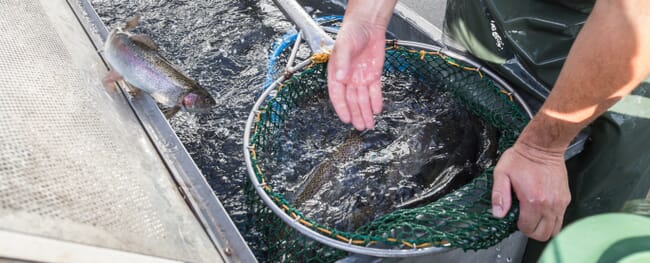
© Tobias Arhelger, stock.adobe.com
Aquatic Life Institute aims to improve the welfare of aquatic animals farmed for human consumption by refining the conditions in which animals are kept or captured in the seafood system and its supply chain.
The new initiative seeks to showcase the most welfare-conscious producers in the world and say that benefits of participating in the study include:
- Seafood certification/retailer promotion
- An exclusive presentation at the annual Aquatic Life Conference
- Trade show feature
- Media exposure
- Access to a multidisciplinary network of professionals
- Aquatic animal welfare resources
- Inclusion in its publications as a best practice example with a broad audience of policy-makers, industry, and NGOs
“Our intent is to promote better cross-industry collaboration between academic institutions, advocacy organizations, and producer associations to inspire future research that addresses real-life challenges in aquatic animal farming. The information gathered will not only serve as progressive examples of improvements in farming of aquatic animals that can be replicated in various farms, but will also provide valuable guidance to aquaculture farmers, policymakers, and stakeholders, enabling them to continue enhancing animal welfare, productivity, sustainability, and environmental stewardship in aquaculture operations,” explained ALI in a statement.
ALI is specifically seeking information regarding industry best practices in global aquaculture as they relate to positive aquatic animal welfare for Atlantic salmon, rainbow trout, common carp, grass carp, Nile tilapia, European seabass, gilthead seabream, pangasius, turbot and Pacific whiteleg shrimp
The organisation explains that they want to highlight practices that are not only beneficial to producers, but also to the animals themselves, accompanied by welfare indicators that are currently in use for the on-farm evaluation of these pillars and their effectiveness;
- Farm level environmental enrichment strategies
- Water quality optimisation and monitoring
- Total space requirements and ideal stocking densities
- Sustainable feeding and aquafeed composition
- Humane methods of stunning and slaughter.
Ali would like interested parties to fill in this spreadsheet. Questions, comments, and feedback can be directed to Tessa Gonzalez, senior researcher at Aquatic Life Institute (tessa@ali.fish).




